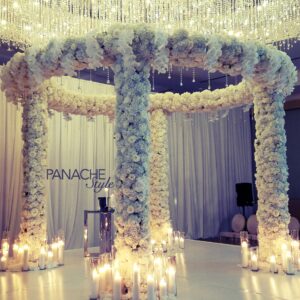Sustainable Event Design: Eco-Luxe Celebrations


In today’s world, sustainability is no longer just a trend; it’s a responsibility. As our planet grapples with the effects of climate change, individuals and businesses alike are being called upon to take action to reduce their environmental impact. This shift is particularly evident in the events industry, where lavish celebrations often incur significant ecological costs. However, the demand for luxury and sustainability are no longer mutually exclusive. Enter the world of sustainable event design, where eco-consciousness meets luxury to create unforgettable yet environmentally responsible experiences.
The Rise of Eco-Luxe Celebrations
Eco-luxury, or “eco-luxe,” refers to high-end products and services that not only exude sophistication and elegance but are also made with a focus on sustainability. In the event planning industry, eco-luxe celebrations combine the best of both worlds—luxury aesthetics and a reduced environmental footprint. Whether it’s a wedding, corporate gala, or private party, today’s hosts are increasingly seeking ways to make their celebrations as sustainable as they are stunning.
Several factors drive this growing demand for eco-luxe events. First, there is rising awareness about environmental issues, especially the impact of single-use plastics, waste, and carbon emissions. Second, there is a shift in consumer values, where people place more importance on experiences over material goods. Third, sustainable options are increasingly available that do not sacrifice style or luxury.
Sourcing Sustainable Materials
A key element of sustainable event design is the careful selection of materials. From the décor to the food, sustainable sourcing is at the heart of an eco-luxe celebration. Event planners are moving away from traditional one-time-use items such as plastic tablecloths, balloons, and disposable cutlery in favour of reusable, biodegradable, and upcycled alternatives.
For instance, florals—often a focal point of high-end events—can be sourced from local, organic farms, reducing the carbon footprint associated with long-distance transportation. Many event planners also opt for seasonal flowers, ensuring that the blooms used are eco-friendly and appropriate for the time of year.
Sustainable Catering and Beverage Service
Food and beverage services are integral to any luxury event. However, catering for large events can lead to significant waste, especially when food is not consumed or packaged in non-recyclable materials. Sustainable catering practices address this by focusing on local, seasonal, and organic ingredients, reducing the carbon footprint, and supporting local farmers and producers.
Compostable plates, napkins, and cutlery made from bamboo, palm leaves, or other biodegradable materials can replace single-use plastics. In addition, many caterers are now offering plant-based menu options, which are more resource-efficient and better for the environment. Reducing meat consumption, particularly beef and lamb, can significantly lower the event’s overall carbon footprint.
Waste Reduction Strategies
Waste is a significant concern in event planning, especially for large-scale celebrations. In the past, lavish events often meant heaps of discarded decorations, packaging, and food waste. However, sustainable event design emphasizes waste reduction by focusing on thoughtful event logistics and recycling.
One effective strategy is to reduce the amount of disposable waste generated. Event organizers can rent décor and furniture instead of purchasing or using disposable options. Table settings can be carefully curated to minimize excess, while reusable linens and cloth napkins reduce the need for single-use products. Recycle bins and composting stations should be easily accessible throughout the event to encourage proper waste disposal.
Green Venues and Transportation Solutions
Choosing the right venue plays a significant role in creating a sustainable event. Eco-luxe venues often implement energy-efficient practices, use sustainable building materials, and incorporate green spaces or outdoor areas to reduce environmental impact. These venues may also partner with local vendors who prioritize sustainability, ensuring that every aspect of the event aligns with eco-conscious values.
Transportation is another critical factor to consider when designing an eco-luxe celebration. Limiting the carbon footprint associated with travel is possible by selecting a venue centrally located for guests or offering shuttle services to reduce the number of vehicles on the road. In addition, many event planners are now arranging for electric vehicle fleets or hybrid cars to transport guests, further reducing emissions.
Designing with Purpose
Ultimately, the key to an unforgettable eco-luxe event is designing with purpose. Every element—from the venue to the catering to the décor—should reflect the host’s commitment to sustainability while ensuring an extraordinary guest experience. Incorporating sustainable practices benefits the environment and enhances the overall experience, making it more meaningful and impactful for guests.
As eco-conscious luxury becomes more prevalent, the future of event design will undoubtedly continue to evolve toward sustainability. Whether it’s a glamorous wedding, an exclusive corporate gathering, or an intimate celebration, the possibilities for creating a lavish, eco-friendly event are limitless. By prioritizing sustainability without compromising style, hosts can enjoy a celebration that is as good for the planet as it is for the people attending.
